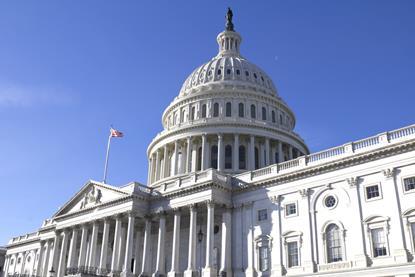Climate policy
The manifestation of climate change-induced physical risks, the risks of a disorderly transition, and the risk of a failure to transition to net zero are causing irreversible impacts on society and the environment, and destabilising effects on the financial system. A clear, consistent, and enabling policy environment is critical to the viability of the net zero transition, and successful policy implementation helps minimise risks to the real economy, to individual systems, and to the financial system as a whole.
Reports by region/category
Global
Investor briefing - Investor sustainability disclosure frameworks and regulations
This investor briefing provides a global overvew and comparative analysis of sustainability disclosure frameworks and regulations.
Investor briefing: ICJ advisory opinion on the obligations of states in respect to climate change
This investor briefing outlines the International Court of Justice (ICJ) Advisory Opinion on the Obligation of States in Respect to Climate Change and the consequences of failing to meet them.
Policy briefing: Baku to Belém roadmap to US$1.3 trillion – key themes for investors
This briefing outlines high-level themes of relevance to investors on climate finance and specifically the Baku to Belém Roadmap to US$1.3trillion – a key element of a new climate finance agreement reached at COP29 in 2024.
Climate Policy Roadmap 2024/25
Ahead of COP 29, PRI published a Climate Policy Roadmap for 2024/25.
Briefing: A comparative analysis of climate disclosure rules and standards
This briefing compares climate disclosure requirements within the ISSB standards, US SEC climate disclosure rule and European Sustainability Reporting Standards.
Nature Policy Roadmap: Policy recommendations for scaling up investor action for nature
This discussion paper sets out the importance of nature to economic and social systems, its relevance to responsible investors and the PRI’s approach to nature policy.
2022 Policy Roundup
In 2022 there was a strong focus of sustainable finance policy reforms across jurisdictions worldwide. In this briefing we provide a short roundup of policy developments in each of the PRI Policy Team’s key jurisdictions.
Briefing: A comparative analysis of draft climate disclosure rules and standards
Similarities and differences across major climate-related disclosure requirements proposed this year, and a comparison with the recommendations and guidance from the TCFD.
PRI discussion paper on TCFD forward-looking metrics consultation
[Region: Global] This paper looks at the TCFD consultation on forward-looking metrics for financial institutions and makes some recommendations for how the Taskforce may look to develop its guidance.
EU
Policy briefing: Addressing EU bioenergy policy and investment risks
This policy report assesses the role of bioenergy for the EU’s renewable energy targets, and how to use biomass most effectively to achieve competing energy, climate, and nature objectives, and contribute to the EU net-zero economy transition.
Policy briefing: EU Critical Raw Materials Act
This briefing summarises the key elements of the EU Critical Raw Material Act (CRMA) which aims to reduce reliance on imports of critical raw materials (CRMs) through a series of measures, including increasing recycling, increasing domestic production, and requiring in scope companies to undertake supply chain audits.
Policy briefing: Signatory responses to state anti-ESG laws
This briefing summarises interviews with US signatories regarding the impact of state anti-ESG laws on their business operations.
The role of the G7 in driving the economic transition
A policy paper calling for increased policy action to drive a just, sustainable economic transition to net zero.
Investor briefing: EU Corporate Sustainability Due Diligence Directive (CSDDD)
This briefing note summarises the requirements of the CSDDD, with particular focus on how it will affect the investment sector.
Implementing a 2040 climate target for a competitive and just European Green Deal
This brief summarises PRI recommendations for an EU 2040 climate target and a strong policy framework to implement a competitive net zero economy, accelerate finance for the transition, and create a prosperous and fair European Green Deal for all.
EU regulation on ESG ratings
This paper focuses on the EU legislative proposal to regulate ESG rating providers, as discussed in trilogues in January 2024.
2022 Policy Roundup
In 2022 there was a strong focus of sustainable finance policy reforms across jurisdictions worldwide. In this briefing we provide a short roundup of policy developments in each of the PRI Policy Team’s key jurisdictions.
Powering a Green Recovery: How EU recovery funds can support investors and the European Green Deal
The Institutional Investors Group on Climate Change (IIGCC), the PRI and CDP – under the auspices of The Investor Agenda, a common leadership agenda on the climate crisis that is unifying, comprehensive and focused on accelerating investor action for a net zero emissions economy – commissioned Chronos Sustainability to produce ...
Reconciling energy security with net zero commitments (EU)
The war in Ukraine has accentuated the EU’s dependence on fossil fuel imports from Russia and further exacerbated the triple energy policy challenge – energy security, affordability, and addressing climate change – facing governments in Europe and across the globe.
Investor briefing: EU sustainable finance taxonomy
This briefing provides an overview of the EU taxonomy, including a proposed delegated act on gas and nuclear energy.
Alternative solutions to include gas-fired power and nuclear energy in the EU sustainable taxonomy
[Region: EU] This position paper explains why gas-fired power and nuclear energy are not aligned with the objectives of the EU Sustainable Taxonomy, and presents alternative options for their inclusion in the framework.
Delivering net zero emissions in the European Union
[Region: EU] This briefing sets out key priorities to set the EU on a pathway to deliver a net zero emissions economy by 2050; and to do so in a way that is economically, politically and technologically achievable and ultimately beneficial. It is based on research from PRI’s Inevitable Policy ...
UK
Taking stock of sustainable finance policy developments
The PRI’s Director of Global Policy, Margarita Pirovska, examines how policy developments over the past year will impact the work of responsible investors.
PRI and IIGCC policy briefing on key sustainable finance policy priorities for the UK
This joint briefing by the PRI and IIGCC identifies areas that the UK Government should prioritise in the short-term in 2024 to accelerate delivery of the building blocks of the UK’s sustainable finance framework and support progress against the UK’s net zero objectives.
COP out: how the promise of Glasgow has faded
By Eliette Riera, Head of UK Policy, PRI
Investor Briefing: Independent Review of Net Zero
Chris Skidmore’s recently published Net Zero Review captures the transition to a net zero economy as a major pro-business and pro-investment opportunity. It offers policy recommendations centred around backing business, backing local action, delivering energy efficient homes, and using infrastructure to unlock net zero.
2022 Policy Roundup
In 2022 there was a strong focus of sustainable finance policy reforms across jurisdictions worldwide. In this briefing we provide a short roundup of policy developments in each of the PRI Policy Team’s key jurisdictions.
Reconciling energy security with net zero commitments (UK)
The war in Ukraine, alongside the unexpected, renewed focus on energy security and related debates on maintaining the focus on net zero commitments have prompted an update of the PRI’s UK climate policy roadmap (published in June 2020), which reflects the release of the UK Government’s British Energy Security Strategy ...
How government and investors can deliver net zero in the UK
[Region: UK] This briefing sets out the key policy priorities to put the UK on a trajectory to meet net zero emissions by 2050, and the role that investors can play. These priorities are consistent with a green recovery from the COVID-19 crisis.
China
2022 Policy Roundup
In 2022 there was a strong focus of sustainable finance policy reforms across jurisdictions worldwide. In this briefing we provide a short roundup of policy developments in each of the PRI Policy Team’s key jurisdictions.
Delivering carbon neutrality in China
[Region: China] This briefing sets out key policy priorities to set China on a pathway to deliver carbon neutrality; and to do so in a way that is economically, politically and technologically achievable and ultimately beneficial. It is based on research from PRI’s Inevitable Policy Response project.
Japan
2022 Policy Roundup
In 2022 there was a strong focus of sustainable finance policy reforms across jurisdictions worldwide. In this briefing we provide a short roundup of policy developments in each of the PRI Policy Team’s key jurisdictions.
Policy briefing: Japan’s power sector and net zero
Japan’s commitment to net-zero by 2050, announced by the former Prime Minister Yoshihide Suga and enshrined in Japanese law, has profound implications for the country’s power sector.
Delivering net zero emissions in Japan
[Region: Japan] This briefing sets out key policy priorities to set Japan on a pathway to achieve a net zero emissions economy; and to do so in a way that is economically, politically and technologically achievable and ultimately beneficial. It is based on research from PRI’s Inevitable Policy Response project.
US
Policy briefing: Enabling US state-level sustainable financial systems
[Region: US] Five high-level policy recommendations that US state and local officials can consider to support responsible investment practices.
Demand for Climate Data is Not Going Away
Greg Hershman, Head of US Policy, PRI
2022 Policy Roundup
In 2022 there was a strong focus of sustainable finance policy reforms across jurisdictions worldwide. In this briefing we provide a short roundup of policy developments in each of the PRI Policy Team’s key jurisdictions.
How government and investors can deliver net-zero in the US
[Region: US] This report sets out priorities for US federal climate policy which are economically feasible, readily implementable, and necessary. Policy reform can also represent a growth opportunity to enhance US competitiveness and retool large sections of the US economy.





































